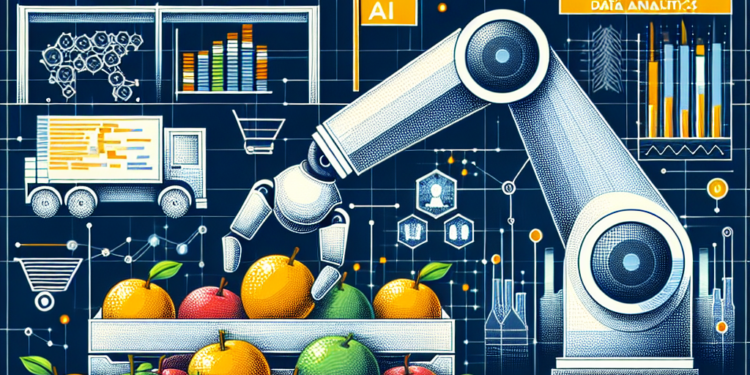Artificial Intelligence (AI) has completely revolutionized various industries, and the food supply chain is no exception. With its ability to analyze huge amounts of data quickly and accurately, AI has the potential to streamline the entire food supply chain process, from production to distribution. From reducing waste and optimizing inventory to predicting consumer demand and improving food safety, AI is transforming the way the food industry operates.
One of the key benefits of AI in the food supply chain is its ability to optimize inventory management. By analyzing historical data and real-time information, AI algorithms can predict demand more accurately and help companies manage their inventory levels more efficiently. This can reduce the risk of overstocking or understocking, which can lead to costly waste or lost sales. With AI, companies can better forecast demand, adjust production levels accordingly, and ensure that their products are delivered to consumers in a timely manner.
AI can also help improve food safety within the supply chain. By providing real-time monitoring of food production and distribution processes, AI can identify potential issues before they become serious problems. For example, AI can detect anomalies in temperature, humidity, or other environmental conditions that could lead to food spoilage or contamination. By catching these issues early, companies can take corrective action to prevent foodborne illnesses and maintain the quality of their products.
Furthermore, AI can optimize the logistics and distribution aspects of the food supply chain. By analyzing data on transportation routes, traffic patterns, and delivery times, AI can help companies optimize their distribution networks to reduce costs and improve efficiency. AI can also help companies track shipments in real-time, identify potential delays or disruptions, and reroute deliveries as needed. This can help ensure that products are delivered to consumers in a timely and cost-effective manner, ultimately improving customer satisfaction and loyalty.
Another way that AI is impacting the food supply chain is through the use of predictive analytics. By analyzing data on consumer preferences, market trends, and weather patterns, AI can help companies predict consumer demand more accurately. This can be especially useful for seasonal products or products with short shelf lives, where demand can fluctuate significantly. By accurately predicting demand, companies can adjust their production levels, pricing strategies, and marketing efforts to meet consumer needs and maximize sales.
AI is also helping companies reduce waste within the food supply chain. By analyzing data on production processes, inventory levels, and consumer behavior, AI can help companies identify areas where waste is occurring and implement strategies to reduce it. For example, AI can help companies better manage perishable goods, optimize production schedules, and reduce overproduction. By reducing waste, companies can improve their bottom line, reduce their environmental impact, and contribute to a more sustainable food supply chain.
In addition, AI is helping to improve the traceability and transparency of the food supply chain. By using blockchain technology and other advanced tracking systems, AI can ensure that products are sourced ethically, processed safely, and delivered securely. This can help build consumer trust and confidence in the food supply chain, as consumers are increasingly concerned about where their food comes from and how it is produced. By providing transparency and traceability, companies can differentiate themselves in the market and build stronger relationships with consumers.
Overall, AI is revolutionizing the food supply chain in numerous ways. From optimizing inventory management and improving food safety to predicting consumer demand and reducing waste, AI is helping companies operate more efficiently and effectively. As AI continues to evolve and become more sophisticated, its impact on the food supply chain will only grow stronger. Companies that embrace AI technology will be better positioned to succeed in the increasingly competitive and complex food industry landscape.













